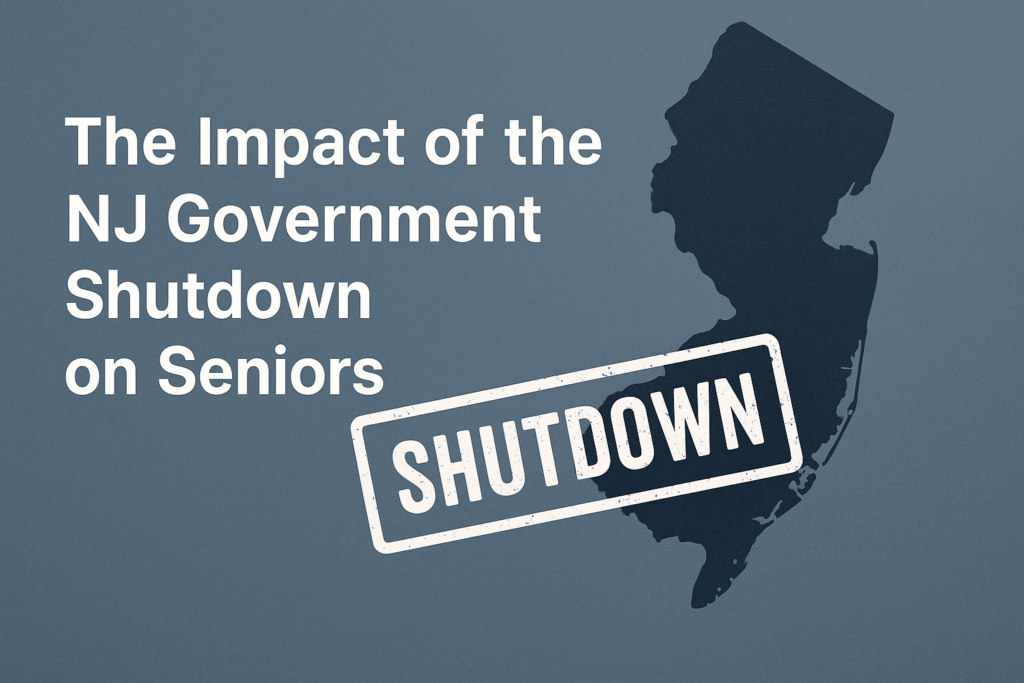Published: October 2025
Category: Senior News & Updates
By: 60AndOver.net Editorial Team
🇺🇸 Why This Matters Now
The federal government shutdown is creating uncertainty across the nation — but for seniors in New Jersey, the questions hit close to home.
Will Social Security checks stop? What happens to Medicare coverage, prescription assistance, or telehealth visits? And are there local programs stepping in to help?
The good news is that core benefits like Social Security and Medicare remain active. But several programs, services, and local supports that older adults rely on could face slowdowns or temporary suspension if the shutdown drags on.
Here’s a full breakdown of what’s safe, what could be delayed, and what you can do right now to stay protected.
💰 What’s Safe: Social Security, SSI, and Medicare
The Social Security Administration (SSA) and Centers for Medicare & Medicaid Services (CMS) are considered mandatory programs, meaning their funding isn’t controlled by annual congressional spending bills.
That means:
- Social Security and SSI checks will continue to arrive on schedule.
- Medicare and Medicaid coverage remains active.
- Existing benefits are safe.
However, customer service will be slower. Local Social Security offices in New Jersey are open but operating with reduced staff. This may affect requests such as:
- Replacing lost Medicare cards
- Correcting benefit or earnings records
- Address changes
- Appeals or overpayment reviews
So, while your payments continue, getting help or updates may take longer than usual.
⚠️ What’s Delayed or at Risk
Even though the most essential benefits remain stable, other programs and services could feel the pinch:
1. Telehealth and Home-Care Programs
In New Jersey, several “Hospital-at-Home” and telehealth initiatives that help older adults avoid unnecessary hospital stays have been temporarily paused.
That means seniors who depend on home-based monitoring or video visits may need to schedule more in-person appointments.
2. COLA Announcement Delay
The annual Cost-of-Living Adjustment (COLA) announcement — which affects Social Security payment increases for 2026 — is expected to be delayed.
This happens because the Bureau of Labor Statistics (which reports inflation data) is partially shut down, delaying CPI data releases.
3. Nutrition and Food Assistance
Programs like SNAP (food stamps) and Meals on Wheels could experience funding shortages if the shutdown lasts several weeks.
New Jersey agencies are trying to fill the gap, but local food programs may feel extra strain.
4. Service Delays and Staffing Cuts
SSA and Medicare phone lines are overwhelmed nationwide. Expect longer hold times and reduced appointment availability at local offices.
5. Local Ripple Effects
Thousands of New Jersey federal employees are currently furloughed or working without pay — which can impact family caregivers, senior service staff, and community support networks.
🏛️ The New Jersey Angle
Governor Phil Murphy has instructed state departments to minimize the impact on residents, especially vulnerable populations.
New Jersey’s aging population — more than 1.5 million residents aged 60 and over — depends heavily on federal-linked programs.
To offset disruption, state and local efforts are ramping up:
- Shutdown Resource Fairs — hosted by U.S. Senator Andy Kim and local agencies — offer help with benefit questions, healthcare guidance, and housing support.
- County Senior Services Offices are coordinating with the NJ Department of Human Services to assist anyone facing lapses in SNAP, Medicaid, or housing aid.
- Telehealth Alternatives: Some NJ hospital systems are extending in-person hours and adding volunteer patient transport for older adults who lost access to remote visits.
These community-level responses aim to cushion seniors from the shutdown’s worst effects — but they rely on public awareness and participation.
What Seniors Can Do Right Now
Even if your benefits continue, it’s wise to take small steps to protect yourself and prepare for potential disruptions.
1. Keep key documents handy.
Download or print copies of your:
- Medicare and Social Security cards
- Proof of benefits letters
- Prescription lists and provider contact info
2. Avoid scams.
Shutdowns create confusion — and scammers take advantage. If someone claims your “benefits are frozen” or asks for payment to restore them, it’s a fraud. Hang up and call your local SSA office directly.
3. Confirm your telehealth arrangements.
If you’ve been using video appointments, call your provider to see if sessions are paused and what alternatives are offered.
4. Contact local senior centers or agencies.
In NJ, start with your County Office on Aging or Area Agency on Aging. They can help you access backup food programs, caregiver assistance, or transportation.
5. Share updates.
Many older adults may not be online. Help spread reliable information to friends, neighbors, or relatives who might be confused about what’s happening.
🧭 Helpful New Jersey Resources
- Social Security Administration (SSA): ssa.gov/news
- NJ Department of Human Services: nj.gov/humanservices
- NJ Aging & Disability Resource Connection (ADRC): adrcnj.org
- Governor’s Office Updates: nj.gov/governor/news
- Sen. Andy Kim Resource Fair Info: wrnjradio.com
- Medicare Helpline: 1-800-MEDICARE (1-800-633-4227)
💬 Final Word
The federal shutdown is unsettling, but seniors in New Jersey should take comfort in this: your Social Security and Medicare benefits remain safe.
What’s most affected are support systems — the calls, services, and programs that make navigating retirement easier.
This is a moment to stay informed, stay patient, and stay connected.
And at 60AndOver.net, we’ll continue tracking these developments to keep you updated — clearly, calmly, and factually.





